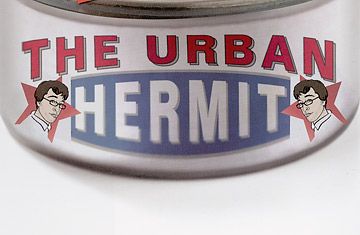
The Urban Hermit
By Sam MacDonald
St. Martin's Press; 281 pages
The Gist:
When Sam MacDonald graduated from Yale in 1995, he didn't go chasing after his dreams. He went chasing after booze. And drugs. And food. By 2000, he weighed nearly 340 pounds and owed thousands of dollars in taxes, student loans and credit-card debt. Cue the "Urban Hermit Plan" — a wildly dangerous scheme to subsist on little else but lentils and canned tuna. MacDonald's memoir recounts the unexpected journey he took, morphing from "Fat Bastard" to "Urban Hermit," taking his readers from Baltimore to Bosnia and back again in a tale of "starvation, hard work and blind luck."
Highlight Reel:
1. On his fondness for toxic substances:
MacDonald was something of an alcoholic, though he might be loathe to use that particular term. His ability to consume beer in impossibly large quantities had been well established at Yale. ("MacDonald, perhaps you could trade this for a six-pack?" one of his instructors had quipped when handing him a diploma.) Recalling his college days, MacDonald writes, "I had fun. Loads of it. And not the kind of fun people look back on ten years later and regret. I didn't hurt anybody. I didn't steal anything. I didn't wreck any cars. It was a good time, plain and simple." When his favorite bar in Baltimore decided to shoot a TV commercial, MacDonald recalls being perfectly cast for the part: "a big fat guy who sat around and drank a lot — I was a natural choice."
2. On the birth of the "Urban Hermit Financial Emergency Rotgut Poverty Plan": While the rest of his fellow Yale alums enjoyed high-profile jobs and piles of cash ("It was the nineties, dammit, and they were getting rich. Just like everybody else"), MacDonald did his best to shirk responsibility — including his tax-paying duties. After several IRS agents came calling to collect nearly $2,000 in back taxes, MacDonald began to ponder questions like, "In basic animal terms, what does it take for a human being to survive? Maybe I didn't need to swallow up half of the Rolling Rock and Ecstasy for sale in central Maryland. Maybe I didn't need alot of the things I consumed ... What if I found a way to turn the terrible, seductive beast of indulgence against itself?" He settled upon the arbitrary numbers of 800 calories a day and $8 a week: "It was a strange calculation, and by all acounts a dangerous one ... Could I do it again? I don't know. Would I? I'm even less sure. But I do know this: Hunger is power. And everything else is bullshit."
3. On being offered a drink after nearly two months of sobriety: "Wow. What a thing to say. I had heard it a million times. But suddenly it had real weight. Real meaning. It was like a prayer, a promise, and an indecent proposal, all mashed together and sung to a catchy little tune: 'Can I get you something to drink? Tra-la-la! Tra-la-la!'"
4. On becoming a journalist: "I quit one job after another during those four years in Baltimore, moving from bouncing and bartending to investment banking and financial publishing. It's not that I couldn't do the work ... I was a good employee. In fact, I hardly ever quit until I got a promotion. The last thing I wanted was a job that called for nice clothes, a respectable car, and a decent apartment. Journalism, I figured, was my last resort. Hemingway made it sound easy enough." His chosen profession eventually sent him to Bosnia to cover Maryland soldiers for a small community newspaper, and later to an annual festival called the Rainbow Gathering, where he covered hippies, drugs and "spontaneous order" for the libertarian magazine Reason.
5. On why his book is a memoir and nothing else: After just a few months of eating nothing but lentils, tuna, boiled cabbage and black beans, MacDonald had lost nearly 100 pounds. Still, "This is not a diet book. Why not? Because diet books sell crazy. And by 'crazy' I mean sheer, unadulterated cuckoo. Americans spend more than $50 billion a year on diet products, and they spend a huge chunk of that total on books ... Anyone stupid enough to view The Urban Hermit as a diet book and use it as such will probably die of kidney failure. And deservedly so. Seriously, don't try it. You'll get hurt. Besides, it really sucks."
The Lowdown:
MacDonald's "Fat Bastard" persona is one we can all recognize: that particularly odious American mentality of indulgence and irresponsibility, of charging one's life on a credit card until the IRS comes a-knockin'. But the scheme MacDonald concocted to kill said bastard is uniquely his own, and the life he lived throughout the ordeal is as unbelievable as it sounds. How did MacDonald not die in the process? Just as fascinating are the glimpses of life in the U.S. in 2000. As MacDonald notes, "If I had been paying attention, I might have noticed that it was an interesting time to be alive in America. There was an election in the works, and it was sizing up to be a real humdinger. It was the year 2000. Peacetime. Boom time. An era of big ideas." But in 2008, with a faltering economy and a war on two fronts, this tale of self-induced starvation just doesn't seem as funny. Can lentils and hard-boiled eggs save us all?
The Verdict: Toss
